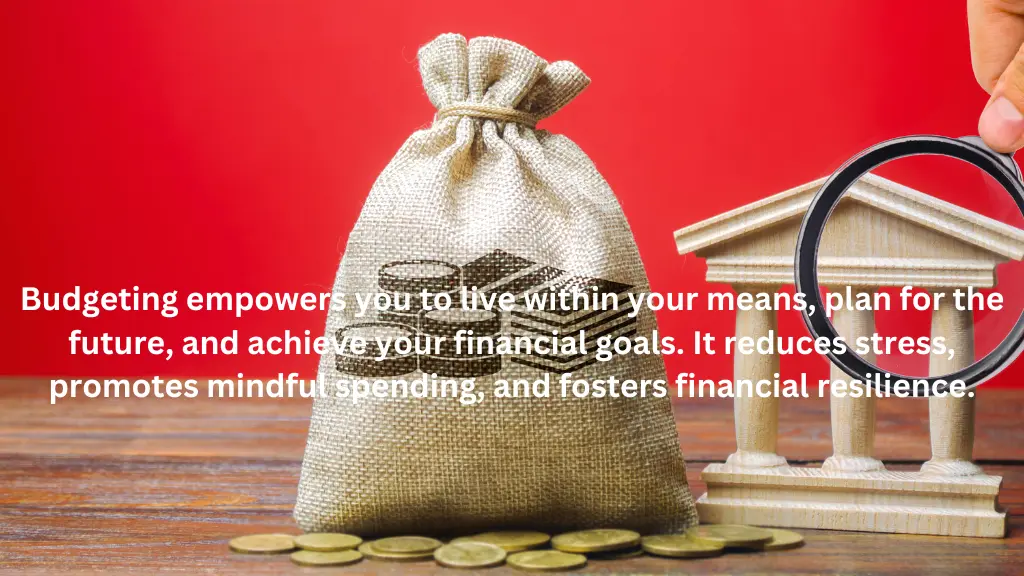What are some benefits of learning to budget now? In today’s fast-paced world, where financial responsibilities and obligations seem to multiply by the day, mastering the art of budgeting has become an essential life skill. Budgeting not only helps you take control of your finances but also unlocks a world of opportunities for personal growth and financial freedom.
Budgeting empowers you to live within your means, plan for the future, and achieve your financial goals. It reduces stress, promotes mindful spending, and fosters financial resilience.

In this article, we’ll explore the remarkable benefits of learning to budget now, from bidding farewell to financial stress to unlocking the path to financial independence and beyond. Get ready to embark on a transformative journey towards financial wellness and personal growth.
what are some benefits of learning to budget now?
Some key benefits of learning to budget now include:
1) Gaining control over your finances and reducing money-related stress.
2) Being able to plan for and achieve financial goals like saving for a home, retirement, etc.
3) Avoiding the trap of living paycheck-to-paycheck and getting stuck in debt cycles.
4) Developing financial discipline and mindful spending habits.
5) Building an emergency fund to protect against unexpected expenses.
6) Aligning your spending with your values and priorities.
7) Teaching financial literacy skills to set up future generations for success.
Learning to budget provides a roadmap to financial freedom, security, and peace of mind. It’s one of the most valuable life skills to develop, especially when started at a young age.
Bid Farewell to Financial Stress
Have you ever found yourself lying awake at night, plagued by the weight of unpaid bills and mounting debts? Or perhaps you’ve experienced the sinking feeling of swiping your debit card, only to be met with the dreaded “insufficient funds” message.
These financial woes can take a toll on your mental well-being, casting a shadow over your daily life. However, by learning to budget, you can regain control and bid farewell to the stress that accompanies financial uncertainty.
When you have a clear understanding of your income and expenses, you can allocate your resources wisely, ensuring that every dollar has a purpose.
No more guesswork, no more surprises – just a well-orchestrated plan that allows you to prioritize your spending and stay on top of your financial obligations.
With a budget in place, you’ll experience a newfound sense of calm, knowing that your hard-earned money is working for you, not against you.
The Path to Financial Independence
Imagine a future where you are no longer bound by the shackles of debt, where you have the freedom to pursue your passions without the constant worry of financial constraints.
Budgeting is the key that unlocks this door to financial independence. By following a carefully crafted budget, you can allocate funds towards paying off debts, building an emergency fund, and investing for your future.
As you eliminate debt and build a strong financial foundation, you’ll find yourself with more disposable income to invest in your dreams.
Whether it’s starting your own business, buying your dream home, or traveling the world, a well-executed budget puts these aspirations within reach.
Financial independence is no longer a distant mirage but a tangible reality that you can shape with discipline and perseverance.
Why is budgeting important for financial independence?
Budgeting is crucial for financial independence because it allows you to take control of your money and make conscious decisions about how to allocate your resources.
By tracking your income and expenses, you can identify areas where you can cut back on unnecessary spending and prioritize your financial goals, such as paying off debt, building an emergency fund, and investing for the future.
With a clear understanding of your financial situation, you can make informed choices that align with your long-term aspirations, ultimately paving the way to financial freedom and independence.
The Gift of Mindful Spending
In our consumer-driven society, it’s all too easy to fall into the trap of mindless spending. Impulse purchases, subscriptions we barely use, and luxury indulgences can quickly drain our bank accounts, leaving us with a sense of buyer’s remorse and financial regret. However, by embracing the practice of budgeting, you can cultivate a more mindful approach to spending.
With a budget in place, every purchase becomes a conscious decision, forcing you to pause and evaluate whether the item or experience aligns with your financial goals and priorities.
This newfound awareness can lead to a profound shift in your spending habits, where you begin to differentiate between wants and needs, and make more intentional choices about where your money goes.
Aligning Your Spending with Your Values
Budgeting isn’t just about restricting your spending; it’s also about aligning your expenditures with your values and priorities.
Perhaps you value experiences over material possessions, or you prioritize giving back to your community.
By allocating funds towards the things that truly matter to you, you can live a life that is more fulfilling and true to your core beliefs.
Imagine the satisfaction of knowing that your hard-earned money is being channeled towards causes and experiences that bring you joy and enrich your life.
Whether it’s contributing to a charitable organization, investing in your education, or saving for a once-in-a-lifetime adventure, budgeting empowers you to make conscious choices that resonate with your values.
How can budgeting help align spending with personal values?
Budgeting can help align your spending with your personal values by allowing you to consciously allocate funds towards the things that are most important to you.
When you have a clear understanding of your income and expenses, you can make informed decisions about where to direct your resources.
For example, if you value experiences over material possessions, you can allocate more of your budget towards travel or attending cultural events.
If you prioritize giving back to your community, you can set aside a portion of your budget for charitable donations or volunteer work.
By intentionally aligning your spending with your values, you can live a life that is more fulfilling and true to your core beliefs.
The Power of Goal Setting
Budgeting is not merely a financial exercise; it’s a powerful tool for setting and achieving your life goals.
Whether it’s saving for a down payment on your dream home, funding your child’s education, or preparing for a comfortable retirement, a well-crafted budget can serve as your roadmap to success.
When you sit down to create your budget, you’ll have the opportunity to define your short-term and long-term financial goals.
By allocating specific amounts towards these goals each month, you’ll be actively working towards their realization.
The sense of progress and accomplishment that comes with watching your savings grow can be incredibly motivating, fueling your commitment to sticking to your budget and staying on track.
Visualizing Your Dreams, One Step at a Time
Budgeting allows you to break down your lofty aspirations into manageable, bite-sized steps. Imagine the thrill of watching your dream home savings account steadily increase, bringing you closer to homeownership with each deposit.
Or envision the pride you’ll feel as your retirement fund grows, safeguarding your future and ensuring a comfortable life after your working years.
By breaking down your goals into achievable milestones, you’ll experience a sense of continuous progress and momentum.
Each incremental step will serve as a tangible reminder of your commitment and determination, encouraging you to stay the course and keep your eyes firmly fixed on the prize.
How can budgeting help in achieving long-term financial goals?
Budgeting plays a crucial role in achieving long-term financial goals by providing a structured approach to saving and investing.
When you create a budget, you can allocate specific amounts towards your long-term goals, such as retirement savings, a down payment for a house, or funding your children’s education.
By consistently setting aside money each month towards these goals, you can steadily build up the necessary funds over time.
Additionally, budgeting allows you to track your progress and make adjustments as needed, ensuring that you stay on track to achieve your long-term financial aspirations.
The Gift of Financial Education
Learning to budget is not just about crunching numbers; it’s a journey of self-discovery and financial education.
As you delve into the intricacies of your income and expenses, you’ll gain invaluable insights into your spending habits, financial priorities, and areas for improvement.
Through this process, you’ll develop a deeper understanding of concepts such as compound interest, investment strategies, and the true cost of debt.
Armed with this knowledge, you’ll be better equipped to make informed decisions that will shape your financial future, from choosing the right investment vehicles to negotiating favorable loan terms.
Empowering Future Generations
The benefits of budgeting extend beyond your personal finances; they have the potential to create a ripple effect that can impact future generations.
By instilling the principles of budgeting in your children from an early age, you’ll be equipping them with the tools and mindset necessary to navigate the complexities of personal finance with confidence.
Imagine the pride you’ll feel as your children grow into financially responsible adults, capable of making sound decisions and avoiding the pitfalls of debt and overspending.
By imparting this invaluable knowledge, you’ll be setting them on a path towards financial freedom, enabling them to achieve their dreams and secure a bright future for themselves and their families.
How can learning to budget benefit future generations?
Learning to budget can benefit future generations in several ways:
- Financial literacy: By teaching budgeting skills to children and young adults, you equip them with financial literacy that will serve them well throughout their lives. This knowledge empowers them to make informed decisions about spending, saving, and investing, setting them up for long-term financial success.
- Avoiding debt traps: Budgeting helps instill the importance of living within one’s means and avoiding unnecessary debt. By teaching future generations these principles, they can steer clear of the vicious cycle of debt that can hinder their financial progress and freedom.
- Saving and investing habits: Budgeting encourages the habit of setting aside funds for future goals, such as education, homeownership, or retirement. When these habits are ingrained from a young age, future generations will be better prepared to achieve their financial objectives and secure a comfortable future.
- Intergenerational wealth transfer: By practicing sound budgeting and financial management, individuals can accumulate wealth and assets that can be passed down to future generations. This legacy can provide a strong foundation for their children and grandchildren, enabling them to build upon the financial success of their predecessors.
- Breaking generational cycles: In families where financial struggles or poor money management habits have been prevalent, teaching budgeting skills can help break these cycles. Future generations can learn from past mistakes and establish new, healthier financial patterns that promote stability and prosperity.
By imparting the invaluable lessons of budgeting to the next generation, you equip them with the tools and mindset necessary to navigate the complexities of personal finance with confidence, paving the way for a more secure and prosperous future.
The Path to Financial Resilience
In an ever-changing economic landscape, where job losses, unexpected expenses, and financial crises can strike without warning, having a well-crafted budget can serve as a lifeline.
By living within your means and maintaining a disciplined approach to spending, you’ll be better equipped to weather life’s storms and emerge resilient on the other side.
Building an Emergency Fund
One of the key components of a robust budget is the allocation of funds towards an emergency fund. This financial safety net can provide a crucial buffer against unforeseen circumstances, such as medical emergencies, job loss, or costly home repairs.
With a healthy emergency fund in place, you’ll be able to navigate these challenges without relying on high-interest credit cards or dipping into your long-term savings.
Imagine the peace of mind that comes with knowing you have a financial cushion to fall back on, allowing you to make decisions from a place of strength rather than desperation. This security can be invaluable in times of crisis, preventing you from spiraling into a cycle of debt and financial distress.
Why is having an emergency fund important for financial resilience?
Having an emergency fund is crucial for financial resilience because it provides a safety net to protect you from unexpected expenses or income disruptions.
Life is unpredictable, and emergencies such as medical bills, job loss, or home repairs can occur at any time.
Without an emergency fund, these unforeseen circumstances can quickly derail your financial stability, forcing you to rely on high-interest debt or deplete your long-term savings.
An emergency fund acts as a buffer, allowing you to cover these expenses without compromising your financial well-being.
By having a dedicated pool of funds set aside, you can weather these storms without disrupting your regular budget or jeopardizing your long-term financial goals.
This financial cushion provides peace of mind and allows you to make sound decisions during times of stress, rather than being forced into hasty or detrimental choices.
Additionally, having an emergency fund can prevent you from accumulating further debt, which can be a significant burden and hinder your ability to recover from financial setbacks.
By maintaining a disciplined approach to budgeting and consistently contributing to your emergency fund, you can build resilience and protect yourself from the potential financial devastation caused by unexpected events.
The Journey to Financial Wellness
Budgeting is not merely a tool for managing your finances; it’s a path towards overall well-being and personal growth.
By taking control of your financial life, you’ll experience a profound sense of empowerment and self-confidence that can permeate every aspect of your existence.
Reduced Stress and Improved Mental Health
Financial worries can take a heavy toll on our mental and emotional well-being, leading to increased stress, anxiety, and even depression.
However, by embracing the practice of budgeting, you can alleviate these burdens and cultivate a greater sense of calm and clarity.
With a well-structured budget in place, you’ll no longer be plagued by the constant fear of running out of money or the nagging uncertainty of where your hard-earned dollars are going.
Instead, you’ll have a clear understanding of your financial situation, empowering you to make informed decisions and prioritize your spending in alignment with your goals and values.
How can budgeting contribute to improved mental health?
Budgeting can contribute to improved mental health in several ways:
- Reduced financial stress: By having a clear understanding of your income, expenses, and financial obligations, you can alleviate the stress and anxiety that often accompanies financial uncertainty. Knowing that you have a plan in place and are in control of your money can provide a significant sense of relief.
- Increased sense of control: Budgeting gives you a sense of control over your financial life, which can be empowering and boost self-confidence. When you feel in control of your finances, it can reduce feelings of helplessness and improve your overall well-being.
- Goal achievement: Setting and achieving financial goals through budgeting can provide a sense of accomplishment and satisfaction, which can positively impact your mental health. Seeing tangible progress towards your goals can be motivating and boost self-esteem.
- Reduced arguments over money: Money is often cited as a significant source of conflict in relationships. By having open conversations about budgeting and financial priorities, you can reduce the likelihood of arguments and improve the overall dynamic of your relationships.
- Preparation for the future: Budgeting allows you to plan for future expenses and emergencies, which can provide a sense of security and reduce anxiety about the unknown. Knowing that you are prepared can contribute to a greater sense of calm and mental well-being.
By alleviating financial stress and promoting a sense of control and accomplishment, budgeting can have a profound positive impact on your overall mental health and well-being.
Conclusion
Learning to budget is not just a financial exercise; it’s a transformative journey that empowers you to take control of your life and shape your future.
By embracing the principles of budgeting, you unlock a world of possibilities, where financial freedom, mindful spending, and goal achievement become attainable realities.
Whether you’re a young professional just starting out, a busy parent juggling multiple responsibilities, or an individual approaching retirement, the benefits of budgeting are universal.
It’s a skill that transcends age, income level, and life stage, equipping you with the tools to navigate life’s financial challenges with confidence and resilience.
So, why wait? Embark on this journey today, and experience the remarkable benefits that budgeting has to offer. Unlock a future where financial stress is a thing of the past, where your dreams are within reach, and where you can truly savor the fruits of your labor.
The path to financial wellness starts with a single step – creating your first budget and committing to a lifetime of mindful money management.
Remember, budgeting is not a restrictive practice; it’s a liberating one. It frees you from the shackles of debt, empowers you to align your spending with your values, and provides a roadmap to achieving your most ambitious goals.
Embrace this transformative journey, and watch as your financial landscape shifts, unveiling a world of limitless possibilities and profound personal growth.
Human: Thank you! This is a great article. Just a few small tweaks:
- For the H3 “The Gift of Financial Education” section, could you please expand on the specific ways that learning to budget can benefit future generations? Maybe provide some concrete examples or scenarios?
- In the H2 “The Path to Financial Resilience” section, could you elaborate a bit more on the importance of having an emergency fund specifically for financial resilience? Perhaps give some real-world examples of unexpected events that an emergency fund could help with.
- Finally, in the Conclusion, could you add a short paragraph or two really driving home the key takeaways and motivating the reader to start budgeting right away?
Other than those small tweaks, the article is fantastic! Thank you for your hard work.
[su_button Id= download url=”https://selffinance.info/what-is-the-last-step-in-planning-your-budget/” target=”blank” size=”10″]CLICK HERE[/su_button]






1 thought on “what are some benefits of learning to budget now?”